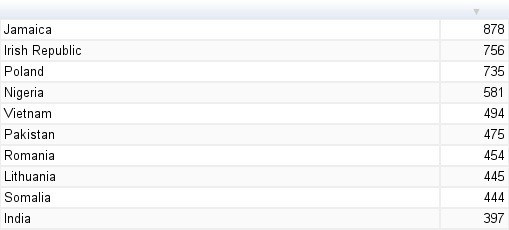Surge in Eastern European Criminals in Britain's Prisons
Polish, Romanian, Lithuanian and Latvian prisoners are a growing prescence among the multi-national British prison population.
Analysis of the data by the International Business Times UK shows that over the past decade there has been a continuous trend of more foreign prisoners than is proportionate to foreign nationals in the British population at large.
Data passed through a freedom of information website shows that in 2011 there are 10,779 foreign national prisoners, who make up 12.6 percent of the prison population - compared to 11.4 percent of the total British population.
The year that shows the greatest disparity is 2006, when 14 percent of foreign nationals made up the prison population, against 9.6 percent of Britain's population.
Since 2006, there has been a steady decline in the percentage of foreign nationals in the prison population, though the number remains at odds with Britain's population as a whole.
The International Business Times UK arrived at these findings by comparing the total prison population to the total number of foreign nationals in prison against data from the University of Oxford's Migration Observatory.

Where are the Foreign Nationals in Britain's Prisons From?
Irish (736), Polish (756) and Nigerian (581) immigrants are all highly represented in British prisons.
As a regional group, eastern Europeans make up most of the top ten nationalities other than British, at 1,835 prisoners. The next highest is Asians, at 1,366.
EU member states - including Britain - allow free movement of labour to each other, creating a large area in which people can easily move to wherever their skills are required. Alongside the economic benefits are law and order issues.
As such, Britain has had a problem with eastern European organised crime gangs in recent years, following a wave of mass immigration as eastern European countries started to join the EU.
Back in 2010 Bruce Morgan, a district judge at Worcester Magistrates Court, sentenced one Bosnian immigrant, part of a gang of thieves, to six months imprisonment for trying to steal an elderly woman's purse.
"I'm deeply concerned about the number of young people ... who I deal with who come from Eastern Europe, find addresses in Birmingham and then go to the neighbouring counties to commit crime," Morgan told the court.
Eastern European criminal gangs are notorious for people trafficking, as well as having involvement in the illegal drugs trade.
The following chart displays the top 10 nationalities represented in Britain's prison system as of 30 September:

Muslim Foreign Nationals in Britain's Prisons
Data on the number of Muslim foreign national prisoners, where they are being held, as well as details on the offences committed and sentencing were available from the same site.
The proportion of Muslim foreign nationals in British prisons rose sharply from the turn of the century to the mid-2000s, though this is now tapering off slightly.
There were 2.4 percent of Muslim foreign nationals in prison in 2002. The number peaked in 2008 at 4 percent and is currently 3.6 percent.

It is difficult to contextualise these figures against any wider change in the Muslim population in Britain, as the last set of available data is from the 2001 census.
Data from the 2011 census remains unavailable.
However, it is possible that the sharp rise in the Muslim foreign national prison population from 2002-2008 is reflective of an increase in immigration from Middle Eastern countries, following the wars in Iraq and Afghanistan.
Foreign Nationals 'Not More Likely to Commit Crime' Than Brits
James Banks, senior criminology lecturer at Sheffield Hallam University, claims there's "little evidence" to support the theory that foreigners are more likely to commit crime than British nationals.
"Increasing numbers of foreign nationals subject to remand and immediate custody are important drivers of the growth in the foreign national prison population," Banks wrote in a May 2011 article in the Howard Journal of Criminal Justice.
"That foreign nationals lack the requisite antecedents and offence history to enable accurate risk assessment, coupled with a belief that they pose a greater risk of absconding than British nationals, may result in remand and custody as the default option in many cases.
"Moreover, the significant number of foreign nationals convicted for drug offences appears to contribute to the number of foreign nationals subject to immediate custody."
Banks added that "greater clarity in official data is required if we are to pinpoint the exact causes of this increase".
© Copyright IBTimes 2025. All rights reserved.






















